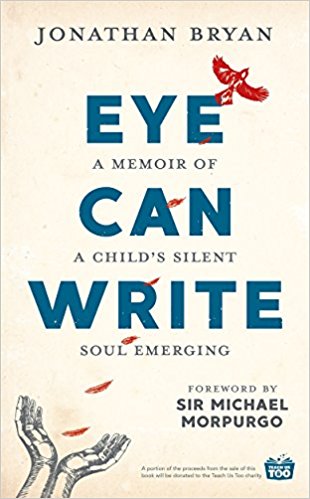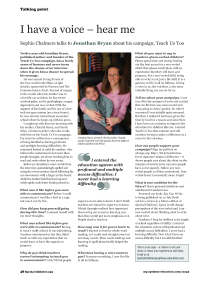Sophie Chalmers talks to Jonathan Bryan about Teach Us Too, his campaign to give all non-verbal children the right to an education.
Jonathan Bryan, pictured with his mother Chantal, speaks eloquently and with passion about the plight of children labelled with PMLD
Twelve-year-old Jonathan Bryan, published author and founder of the Teach Us Too campaign, has a lovely sense of humour and never turns down the chance of an interview when it gives him a chance to spread his message. He was named Young Person of the Year 2018 in the Shine a Light Awards, sponsored by Pearson and The Communication Trust.
Starved of oxygen in the womb when his mother was in a horrific car accident, Jonathan has severe cerebral palsy, and is quadriplegic, oxygen-dependent and non-verbal. With the support of his family and his use of a low-tech eye gaze system (an e-tran frame), he now attends mainstream secondary school where he keeps up with his peers.
I caught up with him one morning with his mother, Chantal Bryan, and Sarah Giles, a former teacher, who also works with him on his Teach Us Too campaign. For years he suffered as a consequence of being labelled as having profound and multiple learning difficulties. He remained locked in until his mother, who believed he understood a lot more than people thought, set about teaching him to read and write when he was seven.
Below are Jonathan’s exact words from the interview, painstakingly spelled out using the e-tran system: Sarah following his eye movements with a finger on the board while his mother held his head up and softly spoke each letter Sarah pointed to.
What was it like before you were able to communicate?
JB: 'Before I could communicate I was like a bird in a cage but now I can fly free.'
How did you keep yourself going during this time?
'I amused myself with my inner thoughts.'
What was school like before you were able to communicate?
'Boring. It wasn’t really school. It was babysitting. Teachers entertained us but they didn’t teach us with any expectation that we would learn or have the capacity to progress.'
Why do you think teachers weren’t attempting to teach you to communicate?
'I don't think people expect us to be able to learn. I don’t think teachers are trained to expect us to learn.
'I think if people realised how important discovering our access to learning was, then they would put more emphasis on it. People need to teach us.'
I entered the education system with profound and multiple access difficulties. I never had a learning difficulty
How easy was it for you to learn to read?
'I learned to read by whole-word reading, so I could read straight away but not many words. Then words built up and learning to spell phonetically helped the reading.'
What does having a voice mean to you?
'It means everything. I now live life in all its fullness.'
What do you want to say to teachers of non-verbal children?
'Please spend time and energy finding out the best access for a non-verbal child; then please teach them with an expectation that they will learn and progress. For a non-verbal child, being able to write is not just a life skill. It is a gateway to life in all its fullness.
'Giving a voice to us, the voiceless, is the most valuable thing you can do for us.'
Tell me about your campaign.
'I was very ill in the summer of 2016 and excited that my life here was near an end and I was going to Jesus’ garden. So when I recovered I was initially quite annoyed.
'But then I realised I had been given the time by God for a reason and since then I have been on a mission to improve the education for children like me. I started Teach Us Too that summer and will continue trying to make a difference as a voice for the voiceless.'
How can people support your campaign?
'Sign my petition on change.org. Every signature makes a difference – it shows people care about the silent on the margins of society [over 260,000 people have so far signed].
'Talk to any non-verbal people as if they understand. Non-verbal doesn’t necessarily mean stupid.'
 What is your ambition for the future?
What is your ambition for the future?
'I have personal ambitions and ambitions for teachers too.
'Personal: my book, Eye Can Write, is being published on 12 July [look out for a review in a future edition of Special Children]. I pray it will change perceptions of the non-verbal and I am now excited about thinking what to write about next.
'Teachers: I long for children to be taught at school regardless of ability. I entered the education system with profound and multiple access difficulties. I never had a learning difficulty. Now I don’t have an access difficulty but I am still disabled.'
 This article originally appeared in issue 243 of Special Children magazine.
This article originally appeared in issue 243 of Special Children magazine.